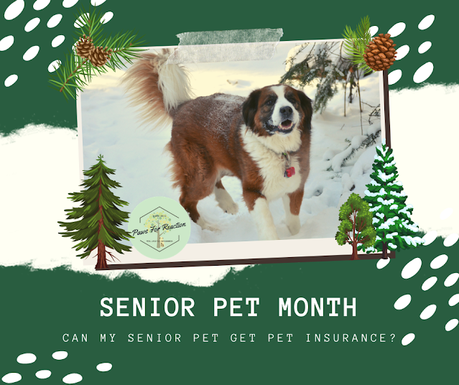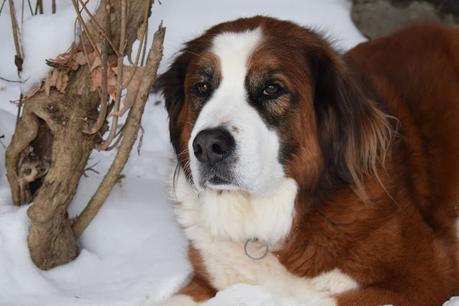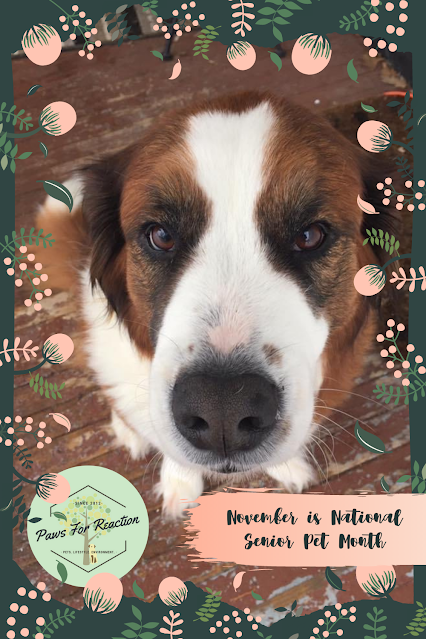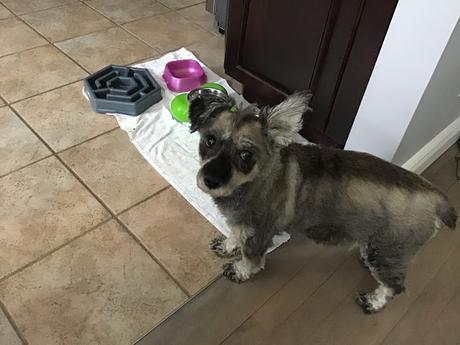National Senior Pet Month: Everything you need to know about senior pets and pet insurance

I love the gray fur that appears around a senior dog's eyes as they age, the mark that they've experienced life. The mark that they've given a lifetime of love. To leave our mark on them we need to prepare to support them during their golden years. I'm going to talk about one of my favorite topics- pet insurance. When we think about pet insurance we often think of puppies and kittens, but senior pets are eligible for insurance coverage too. Since November is National Senior Pet Month, I connected with Karolyne Trottier, Regional Manager at Pets Plus Us pet insurance for a Q&A about pet insurance for senior pets. Can a senior pet get pet insurance? What about their pre-existing conditions? I asked Karolyne everything I could think of about senior pets and pet insurance, and these are her answers!
Q: Can a senior pet sign up for pet insurance?
A: While starting your pet’s insurance policy when they are young and healthy is best, senior pets can still benefit from enrolling in an insurance policy. At Pets Plus Us, no matter how old your dog or cat may be, there’s a coverage option available for them.
Q: What is the maximum age a senior pet can sign up for Pets Plus Us insurance?
A: There is no upper age limit for a pet to enroll in a Pets Plus Us insurance policy.

Q: What are the benefits of purchasing pet insurance for your senior pet?
A: Pet insurance provides coverage for unexpected accidents and illnesses. As your pet begins to age, there is a higher risk of developing chronic health problems. Having pet insurance can help provide peace of mind and empower pet parents to make healthcare decisions based on your pet’s best interest, rather than cost.
Q: If a pet owner wants to purchase pet insurance for their senior pet, what should they know? What is required of them?
A: If someone is considering pet insurance for their senior pet and they already have a medical condition, that condition will be considered pre-existing. It is important to know that no pet insurance provider will cover pre-existing conditions, regardless of the pet’s age. With Pets Plus Us there is no upper age limit on enrollment. If your dog is eight years of age or older (six years of age or older for giant breeds), or your cat is eight years of age or older, your pet’s complete medical history including a recent complete physical examination(within the last 2 months), geriatric blood profile (including T4), and complete urinalysis are required to be submitted within the first 30 days of your policy. We ask for these records so we can underwrite your senior pet’s policy upfront and advise you of any pre-existing conditions before it comes time for you to submit a claim.
Q: Can pet insurance for a senior pet still be affordable?
A: At Pets Plus Us, we offer a range of coverage levels, deductibles, and coinsurance options that allow you to customize your plan to what’s right for you and your pet, and your monthly premiums won’t increase with the age of your pet. The deductible options are age-based and only need to be satisfied once annually (not per incident) on any eligible claims made.

Q: What are the signs of aging in a senior dog or cat? What should you watch for?
A: Normal signs of aging in a dog or a cat include reduced excitability, hearing loss, and sometimes vision loss due to lens clouding. Older pets normally gain or lose small amounts of weight with changes in activity levels. Slight decreases in appetite and energy are normal. Older pets are sometimes more easily frightened and can be less tolerant of children and younger animals. They may not be able to hold their bladder as long as they used to. Some symptoms that people consider “normal” aging changes are actually warning signs about age-related diseases. Significant reductions in activity level could indicate arthritis, heart disease, or other chronic conditions. Marked weight gain or weight loss, as well as dramatic changes in appetite, drinking, and urination habits are also red flags. Incontinence, loss of mobility, and sudden vision loss is not a normal part of aging. If you notice any signs of aging with your senior pet, consult your veterinarian, and schedule a visit.
Q: What can a pet owner do to slow down the aging process?
A: Proper nutrition, consistent exercise, and environmental enrichment (play) are great ways to keep your pet feeling young. Keeping pets lean helps to reduce the stress on aging joints. Supplementing essential fatty acids helps to keep the brain, cardiovascular system, and musculoskeletal system youthful. Start bringing your pet to the vet for twice-yearly checkups to make sure any issues are identified and addressed early. For pets that suffer from arthritis, managing pain on a daily basis improves their comfort, maintains their mobility, and also protects them from muscle loss, and improves their cognitive function.

Meet Karolyne's senior dog, Buddy!
Q: What experiences do you have owning a senior pet? Do you have any advice you can give for a pet owner who is watching their pet age?
A: I own a Schnauzer/Terrier cross who is about 15, and he has been diagnosed with liver and heart disease. As per my veterinarian’s recommendations, he is on several different medications and a special diet. My Pets Plus Us pet insurance policy has helped cover many of these expenses. He occasionally has accidents, sometimes gets confused, and is unable to go for long walks anymore. However, he still loves snuggle time, and dinner is still his favorite time of the day. He still runs our household! My best advice is to enjoy every moment with your fur baby, always keep them healthy and happy and consult with your veterinarian if you have questions or concerns.
Karolyne has given us a great reminder that senior pets qualify for pet insurance too- and may need it more than most pets because the cost of their care can add up quickly. Thank you again to Karolyne and Pets Plus Us for providing answers to all of our pet insurance questions. Visit PetsPlus Us to see what insurance plans are available for your senior pet!

Give me a high paw and follow Paws For Reaction on PinterestLike Paws for Reaction on FacebookFollow @PawsForReaction on TwitterFollow my blog and subscribe in the sidebar >>

